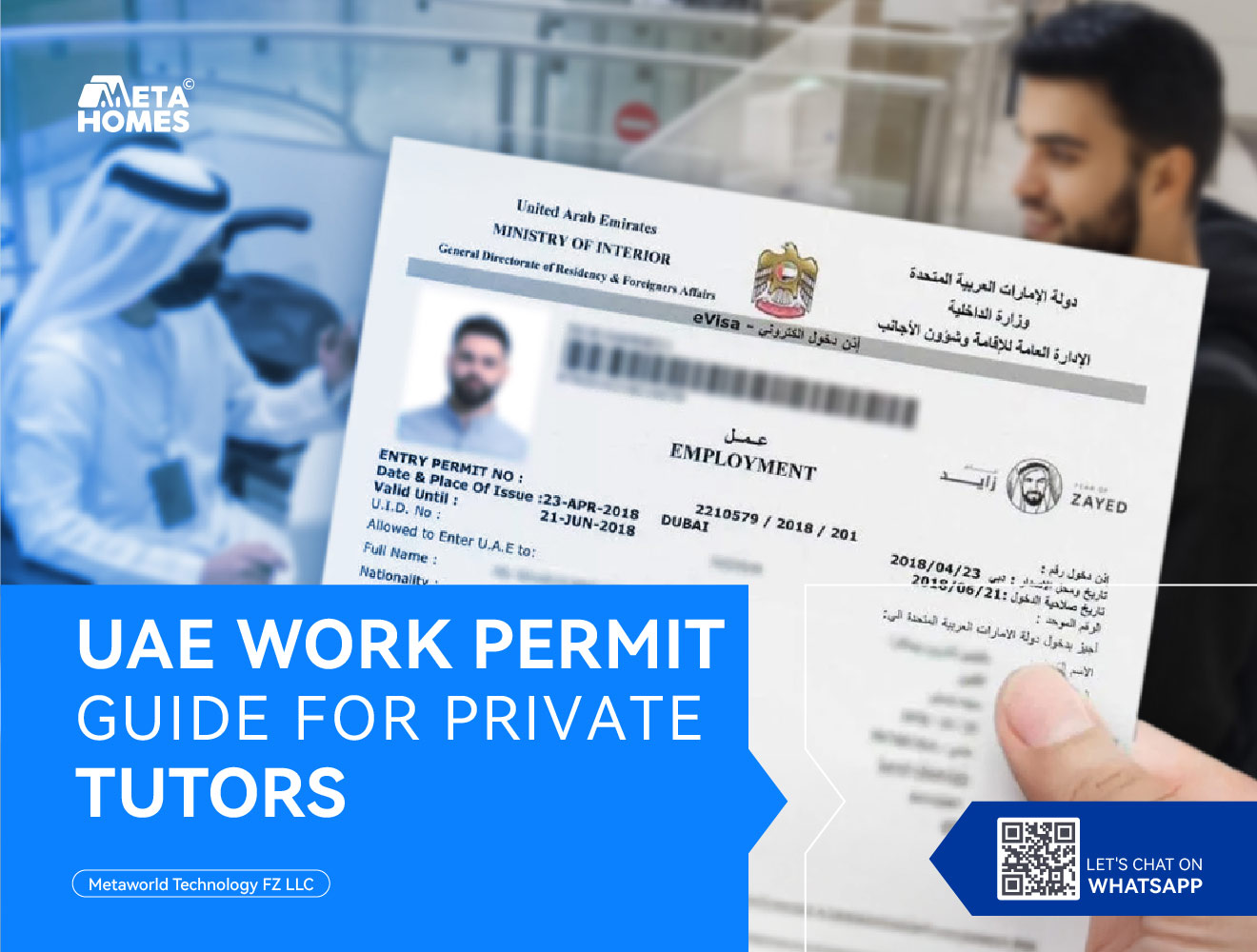
Tutoring in the UAE is a growing profession—and with good reason. Families here invest heavily in one-on-one coaching to help their children excel, while adults seek expert guidance in everything from languages to professional skills.
But before you start teaching, you need the right approvals. To protect quality and safety, the UAE government now requires anyone offering private tutoring services to hold a valid UAE work permit for tutors. Operating without this permit can lead to fines, deportation, or business shutdown.
Why Private Tutors Need A Work Permit
Offering paid private lessons without official approval is illegal in the UAE. The government introduced a dedicated Private Teacher Work Permit under the Ministry of Human Resources and Emiratisation (MoHRE) to:
- Ensure quality: Families can trust that their tutors meet certain standards.
- Protect rights: Legally employed tutors gain benefits like health insurance and labor protections.
- Regulate the market: Prevent unqualified individuals from undercutting honest educators.
Without this permit, you risk fines, deportation, or a ban from returning to the UAE. A valid permit also lets you:
- Open a UAE bank account in your name.
- Sponsor dependents (spouses, children) once you earn enough.
- Access social security benefits and end-of-service gratuity.
- Grants access to health insurance and other benefits.
1. The Legal Framework for Obtaining a Private Tutor’s Permit
There are a few steps required to obtain this permit. They include;
Ministry of Human Resources & Emiratisation (MoHRE)
- Private Teacher Work Permit: Designed for individual tutors teaching students one-on-one or in small groups.
- Who issues it: MoHRE (formerly Ministry of Labour) via its “Essentials” portal.
- Validity: Two years, renewable.
Knowledge & Human Development Authority (KHDA)—Dubai
- Institutional approval: If you teach inside a student’s home in Dubai, KHDA doesn’t directly license tutors, but any center you partner with must be KHDA-approved.
- Online tutoring: Platforms must register with KHDA; individual online tutors require MoHRE permits.
Abu Dhabi Department of Education & Knowledge (ADEK)
- Similar to KHDA for centers in Abu Dhabi. Individual home tutors still follow MoHRE rules, but centers need ADEK licenses.
2. Who Can Apply?
To qualify for the private tutor permit in the UAE, applicants must:
- Be aged 18–60
- Hold a valid UAE residence visa (or be in the process of getting one)
- Possess a clean criminal record (Certificate of Good Conduct)
- Have relevant qualifications (minimum bachelor’s degree or teaching diploma)
- Obtain a No Objection Certificate (NOC) from the current employer or parents (for student tutors)
Full-time students (15–18 years old) may also apply with parental consent and a school NOC, allowing peer tutoring or coaching juniors.
3. Types of Permits & Visas for Tutors
Here are a few:
1. Private Teacher Work Permit (Self-Employed Tutors)
- Who it’s for: Freelance tutors teaching in homes or online.
- Benefits: No company sponsorship needed; you can work independently.
- Limitations: Cannot issue visas to others; income is personal.
2. Company-Sponsored UAE Tutor Visa
- Who it’s for: Tutors employed by a training center, school, or tutoring agency.
- Benefits: Full work visa with residency, health insurance, and potential to sponsor family.
- Requirements: Employer handles visa, office lease, and labor contracts.
3. Freelance Professional License
- Who it’s for: Tutors who want a trade license under a free zone or mainland “freelancer” scheme.
- Benefits: Invoice clients legally, rent an office or co-working space, and sponsor a limited number of visas.
- Costs: License fees vary by free zone; often AED 7,000–15,000 per year.
4. Documents You’ll Need
Whether you apply for the MoHRE permit or a company visa, the documents are the same:
- Passport copy (bio page + valid residence visa)
- Emirates ID copy (if issued)
- Passport-style photo (white background)
- Educational certificates (attested by home UAE embassy + Ministry of Foreign Affairs)
- Certificate of Good Conduct (police clearance in your emirate)
- No Objection Certificate (NOC) from employer or parents (for minors)
- Declaration form signed (available on MoHRE portal)
- Medical fitness certificate (if requested)
For company visa: also provide a signed employment contract and company documents (trade license, office lease).
5. Step-by-Step MoHRE Application Process
Here are the steps needed to obtain a private tutor’s work permit.
Step 1: Attest and Translate Documents
- Non-English/Arabic certificates must be professionally translated and officially attested.
- Good Conduct certificate processing can take 1–2 weeks—plan ahead.
Step 2: Register on MoHRE Essentials
- Use UAE Pass to log in.
- Navigate to “Services → Private Teacher Work Permit.”
Step 3: Fill in Your Details
- Enter personal information, visa details, teaching subjects, and locations (e.g., “Dubai homes,” “online”).
Step 4: Upload Documents
- Clear scans of passport, visa, ID, certificates, NOC, and photo.
Step 5: Submit & E-Sign
- Review all information, sign electronically, and submit.
- You’ll receive a reference number for tracking.
Step 6: Permit Issued
- Typical turnaround: 2 working days.
- No application fee.
- Download and print your permit certificate.
Step 7: (If Needed) Medical Fitness Test
- Conducted at approved clinics.
- Screens for communicable diseases.
6. Getting Your UAE Tutor Visa
If you require a new residency visa along with your tutor permit:
- Secure a Sponsor: Yourself (freelance license) or a company.
- Apply for Entry Permit: Valid 60 days for visa stamping.
- Undergo Medical Tests: Blood tests + chest X-ray at DHA/Veterans clinic.
- Emirates ID Registration: Biometrics at FAIC centers.
- Visa Stamping: Passport stamped at GDRFA.
- Collect Emirates ID: Typically within 10–15 days.
After stamping, you’re fully authorized to live and work as a tutor in the UAE.
7. Costs & Timeline
| Item | Cost (Approx.) | Timeline |
|---|---|---|
| Document attestation (per cert) | AED 150-250 | 3-7 days |
| Good Conduct certificate | AED 100-150 | 1-2 weeks |
| Medical fitness test (if needed) | AED 300-500 | 1 day |
| MoHRE permit application | Free | 2 working days |
| Emirates ID card | AED 170 | 10-15 days |
| Entry permit (Green Visa) | AED 100-200 | 3-5 days |
| Visa stamping & typing fees | AED 600-800 | 1-2 days |
| Freelance license (if chosen) | AED 7,000-15,000 | 1-2 weeks (varies) |
Total time from document prep to fully stamped visa: 3–6 weeks, depending on attestation and sponsor processes.
8. Where You Can Tutor
Your permit covers:
- In-home lessons: Students’ homes or your own home office.
- Training centers: Partner with a KHDA/ADEK-licensed center.
- Online platforms: Any approved virtual teaching tool.
- School premises: With school permission and MoHRE notification.
Always verify local regulations when teaching in Dubai (KHDA) or Abu Dhabi (ADEK).
9. Running Your Tutoring Practice
Here are a few ways:
1. Business Setup Options
- Freelance License: Gives you a trade name, invoicing ability, and visa-sponsoring capacity.
- Training Center Partnership: Use their license, split revenue, and minimal admin.
- Self-Employed Permit Only: Keep it simple, but you can’t sponsor staff or rent office space formally.
2. Contracts & Billing
- Use written contracts outlining hours, fees, cancellation policy, and payment terms.
- Invoice promptly and track payments. Google Sheets or simple accounting apps work fine.
3. Marketing & Growth
- Create a website or social media page.
- Partner with local schools for referrals.
- Ask satisfied students for testimonials.
4. Quality & Ethics
- Deliver lessons professionally.
- Respect cultural norms, including scheduling practices, appropriate dress code, and language sensitivity.
- Follow MoHRE’s code of conduct: no misleading advertising, no unlicensed sub-tutoring.
10. Renewals and Amendments
- Permit Renewal: Begin 30 days before expiry via the MoHRE portal. Update any changed documents.
- Visa Renewal: Begin the sponsor’s renewal process at least 30 days before your visa expires.
- Amendments: To change teaching locations or subjects, update your permit application online.
Failure to renew on time can mean fines of AED 10 per day, up to AED 2,000.
11. Common Pitfalls & How to Avoid Them
Pitfall How to Avoid
Missing Document Attestations Start attestation 4-6 weeks early
Using Personal Account for Income Open a tutor-only bank account
Ignoring Local Authority Rules Check KHDA/ADEK updates monthly
Skipping NOC or Employer Consent Always secure a signed NOC first
Teaching Without Permit Verify permit before first session
12. Tax and Banking Basics
- Bank Account: Use your MoHRE permit to open a dedicated account for tutoring income.
- VAT: Only required if your annual turnover exceeds AED 375,000. Most small tutors can skip VAT registration.
- Personal Income Tax: The UAE has no personal income tax—but maintain records in case of future regulatory changes.
13. Insurance & Liability
- Health Insurance: Mandatory under your visa. The sponsor typically provides basic coverage.
- Professional Indemnity: Optional, but recommended if you teach specialized or exam-prep courses. Costs range AED 500–1,500/year.
- Public Liability: Covers accidents if teaching at your premises. Check local providers for tutor-friendly packages.
14. Teaching Online vs. In-Person
Online Tutoring
- No travel time, more flexibility.
- Ensure stable internet, quiet background, quality webcam.
- Confirm platform compliance with KHDA/ADEK if targeting students in licensed centers.
In-Person Tutoring
- Preferred for younger students.
- Arrange safe, well-lit teaching space.
- Adhere to COVID-19 safety guidelines if still applicable.
15. Best Practices for Success
- Set Clear Learning Goals: Tailor lessons with measurable milestones.
- Use Engaging Materials: Interactive apps, real-world examples.
- Communicate Regularly: Send weekly progress reports to parents or students.
- Stay Professional: Be punctual, prepared, and respectful of cultural norms.
- Collect Feedback: Use Google Forms or quick surveys to improve your service.
Do I need a degree to get a private tutor permit?
Yes, a bachelor’s degree or teaching qualification is typically required. Some emirates may accept significant professional experience instead—check local guidelines.
Can I tutor multiple subjects under one permit?
Absolutely. List all subjects you’re qualified to teach on your application; no need for separate permits per subject.
How long does the permit last?
Two years, with a straightforward renewal process if you’ve stayed compliant.
What’s the difference between the tutor permit and a freelance license?
A tutor permit allows one-to-one teaching only. A freelance license lets you invoice through a business entity and offer broader services (e.g., workshops, group classes).
Can I sponsor my family on a tutor visa?
Yes, once you meet the minimum salary threshold (usually AED 4,000–5,000/month) and have suitable accommodation, you can sponsor family members.
Is there a fee for the private tutor permit?
No, the MoHRE does not currently charge for the Private Teacher Work Permit. You only pay for document attestations and any optional services (e.g., medical tests).
Can students aged 15–18 get the permit?
Yes, with parental consent and a school NOC, students can tutor peers or younger children.
What happens if I tutor without a permit?
You could face fines, deportation, and a ban on future entry to the UAE. Always secure the proper permit before starting.
Can I switch from a private permit to a company visa later?
Absolutely—simply cancel your Private Teacher Permit and apply for a new visa under your employer’s sponsorship.
What if I want to teach in multiple emirates?
List all intended teaching emirates on your permit application. No extra fees, but you must comply with local center regulations (KHDA/ADEK).
How much can private tutors earn in the UAE?
Rates vary by subject and level—from AED 100/hour for general subjects to AED 300+/hour for specialist exam prep or languages.
Securing the correct UAE work permit for tutors and, if needed, a UAE tutor visa, is your first step toward a successful tutoring career in the Emirates.



Comments (10)
situs slot thailandsays:
October 19, 2025 at 2:43 pmYour place is valueble for me. Thanks!…
play jili slotssays:
October 14, 2025 at 7:41 pmI do agree with all of the concepts you’ve offered in your post. They are really convincing and will definitely work. Nonetheless, the posts are very quick for novices. May just you please extend them a bit from next time? Thank you for the post.
upload denial letter attorneysays:
October 2, 2025 at 8:35 pmThis really answered my problem, thank you!
depo 5k qrissays:
September 30, 2025 at 3:19 amYou are a very capable individual!
Trenggaleksays:
September 30, 2025 at 1:21 amSome truly nice stuff on this web site, I love it.
togel onlinesays:
September 30, 2025 at 1:19 amIts good as your other blog posts : D, regards for putting up.
Poço Artesiano Engenheiro Beltrãosays:
September 29, 2025 at 8:04 amI see something truly special in this site.
alexaslot 138says:
September 29, 2025 at 8:01 amI love the efforts you have put in this, thankyou for all the great blog posts.
slot224 link alternatifsays:
September 23, 2025 at 5:30 pmI really treasure your piece of work, Great post.
vorbelutr ioperbirsays:
September 14, 2025 at 9:27 pmLoving the info on this site, you have done great job on the content.